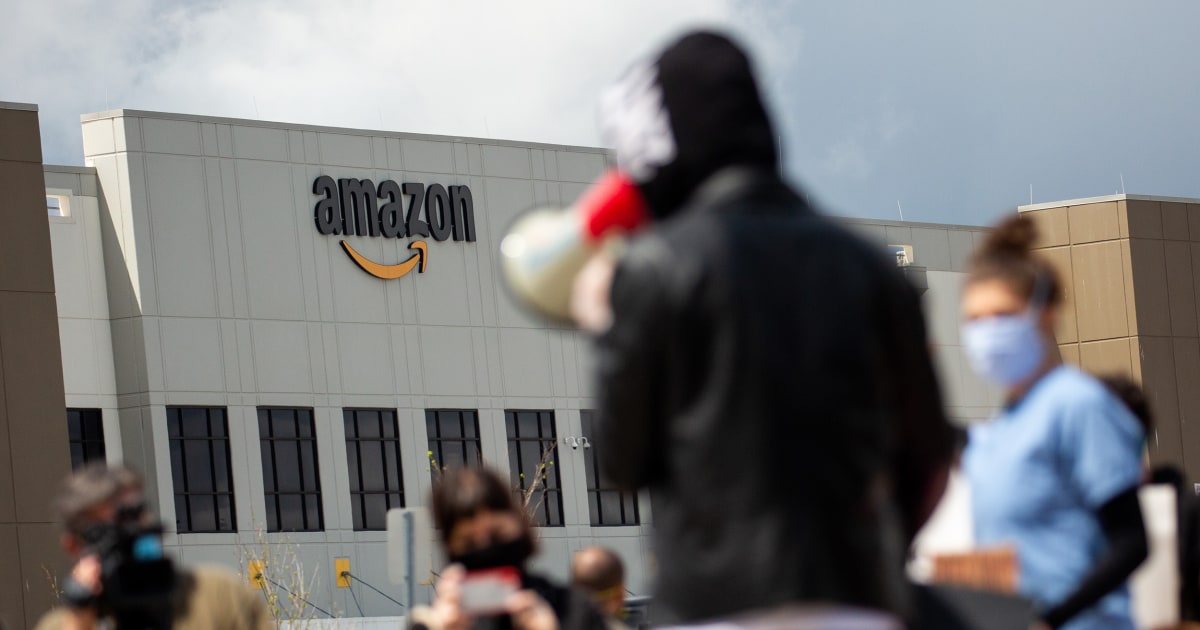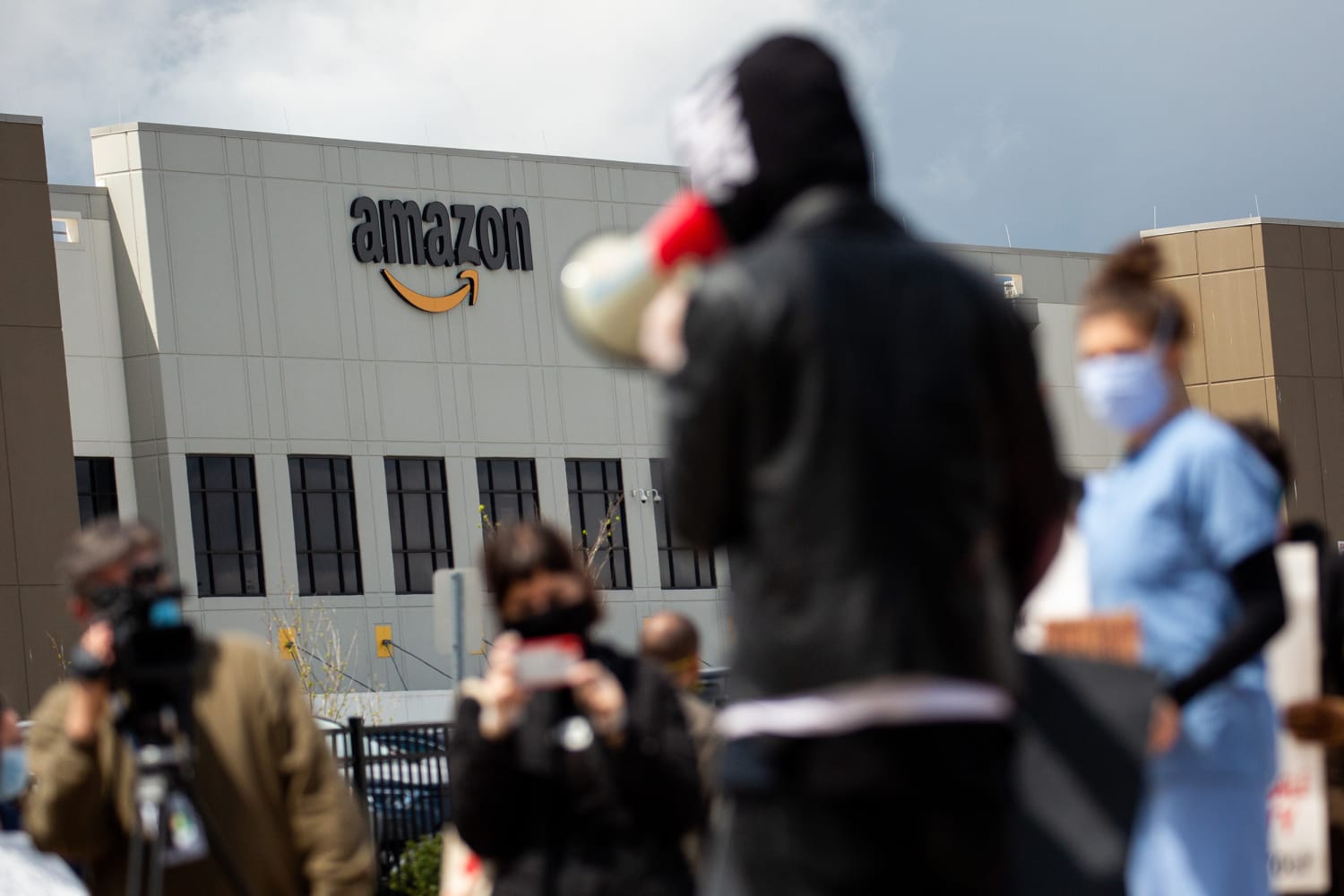
The closing of an Amazon warehouse in New Jersey on Sunday after many workers there tested positive for Covid-19 underscores the broadly dangerous conditions that have characterized this holiday season.
As record numbers of customers filled their online shopping carts before the holidays, warehouse workers, like the ones at the Robbinsville Township facility that closed, have toiled away behind the scenes filling orders through some of the darkest days of the pandemic. While they were deemed by state governments as “essential” and rewarded with hazard pay or cash bonuses for working through the pandemic, many workers and workplace experts found that that was little reward for the conditions they have faced.
“These are risky front-line jobs because of the amount of people in one place, and social distancing is not always possible.” said Nik Theodore, a professor at the University of Illinois at Chicago’s urban planning and policy department. He added that it’s clear that warehouse workers are “a vulnerable population.”
Mandatory overtime
The holiday season is traditionally an intense time for retail and warehouse employees, who now make up a growing share of workers who keep the industry going. But with the dramatic increase in online shopping over the course of the pandemic and the unparalleled growth of the e-commerce supply chain, more workers than ever are packed into indoor warehouses logging long hours.
A Target warehouse worker in New York, who asked to remain anonymous out of fear of retaliation, told NBC News in December that since July, employees at his plant have been working mandatory overtime shifts. With 150 to 200 people working a shift in a 1-million square foot warehouse, it can be difficult to always practice social distancing, he said.
“It’s been pretty rough, I’m not going to lie,” the worker said. “I don’t know the public knows what us warehouse workers are going through to make the holidays happen.”
Target said it has made efforts to enforce social distancing when employees are working. This week, the company started citing people for violating coronavirus safety measures. Target also said that when it schedules overtime in its distribution centers, it communicates to potential workers before they accept a role that requires it.
“We’re committed to creating a safe and positive environment for our team,” said Brian Harper-Tibaldo, a spokesperson for Target. “We’ll continue to listen to and appreciate any feedback shared from our team members.”
It is unclear exactly how many warehouse workers across the country have been infected with the virus or have died as a result of it nationwide. Harper-Tibaldo said the company does not disclose these figures. One Amazon warehouse in Luzerne County, Pennsylvania, counted at least 81 cases, according to records obtained by NBC News.
There have been at least 10 deaths among Amazon workers across the country, according to NBC News research, which the company confirmed in September.
An Amazon spokesperson, Maria Boschetti, said the company has “invested millions of dollars to provide a safe workplace.” It said it also supplies masks, gloves, thermal cameras, thermometers and hand sanitizer to its employees.
The company added there is “strong evidence” that its workers are not spreading the virus at work. It said that “in most cases” the positive virus case rate at its plants is lower than the surrounding communities. When it isn’t, Amazon said “it is usually related to activity outside of work.”
Holiday guidelines
Ahead of the holidays, the Centers for Disease Control and Prevention issued a list of recommendations for employers to keep warehouse workers safe. It suggested employers hire an on-site workplace coordinator for coronavirus assessment and control, conduct daily health checks and roll out flexible sick leave policies. But the recommendations have no teeth, said Debbie Berkowitz, director of the Workplace Safety and Health Program at the National Employment Law Project, a worker advocacy group, and a former top official at the Occupational Safety and Health Administration.
“The CDC guidelines are voluntary,” Berkowitz said. “They’re not enforceable.”
An Amazon warehouse worker in Illinois, who asked to remain anonymous out of fear of retaliation, said that even as orders increased, he was still expected to pack items within the 6 minutes set by the company. This becomes an issue when workers need to approach a bin and they have to wait longer to get items so that they maintain a safe distance. Yet if there is a lag, the computer system docks him as “off task”, he said.
“I don’t think we are being treated as essential workers,” he said in an interview. “There is a big hazard here. Amazon is a good company, but I don’t think they care about us as workers as they should.”
Amazon said that it supports people “who are not performing to the levels expected with dedicated coaching to help them improve.” To implement social distancing, it has staggered work stations and break times to limit congestion. It also rolled out a “distance assistant,” which uses technology to provide employees with live feedback on social distancing over a 50-inch monitor. When workers “intentionally” violate the company’s social distancing guidelines, they will receive a warning. On the second offense, they could be fired.
Temp work
There are even bigger problems for the many warehouse workers hired through temporary agencies. Jesus Ruelas, a former Walmart warehouse worker in Elwood, Illinois, said he was hired through a staffing placement agency, Simos Solutions, to work the holiday season this year. When he tested positive for the coronavirus in October, he had to navigate the unemployment benefits system to support himself while he quarantined for two weeks because he receives benefits from Simos, not Walmart. Under Walmart’s emergency leave policy, company employees receive paid time off should they come down with the virus or show symptoms.
“You have companies making millions of dollars, but a lot of corporations don’t agree with giving employees money for being home,” he said. “I was frustrated.”
Simos Solutions said its workers accrue up to five days of paid sick leave. It said it also provides masks to its associates and requires temperature checks.
Walmart said that “the majority” of people in its supply chain are staff members, not temps, and the need for temp agency workers fluctuates throughout the year.
The reliance on temporary workers through staffing agencies creates a lot of uncertainty about where those employees can go with safety concerns, said Carmen Martino, co-director of the Occupational Training and Education Consortium at Rutgers University.
Temporary workers often get stuck between the staffing agency and the contracted company when they have a grievance, said Martino. In these cases, “workers feel like they have no place to turn,” he said.
Occupational crisis
Since the beginning of the pandemic, OSHA has issued around $3.5 million in penalties from citations as a result of 263 inspections for violations relating to the coronavirus.
“Covid-19 is the single biggest occupational crisis in our lifetime,” said Berkowitz. “All those warehouse workers would have nobody to call.”
For many warehouse workers, the only option is to face another day of work with mounting uncertainty. The Target warehouse worker in New York said there are no other work options in his area that pay enough to support himself and his 5-year-old son. His 10- and 12-hour shifts begin at 4 a.m., which leaves him little time to spend with his son. If his girlfriend wasn’t able to care for his son, he said he wouldn’t know what to do.
“If I was a rock climber climbing up a cliff, I’d be hanging on by one finger,” he said. “What [the company] really doesn’t understand is we’re on the front line of this virus. … They don’t understand how much time away from our family we need to have in order to make this warehouse run.”
Line skipping
With the rollout this month of a long-awaited Covid-19 vaccine, unions, trade groups and individual companies such as DoorDash and Uber have pushed for their workers to be among the first in line to be inoculated. Amazon sent a letter to the CDC last week requesting that its warehouse, data center and Whole Foods Market workers receive the vaccine “at the earliest appropriate time.” But with no comprehensive federal plan, individual states will decide who will be the first essential workers to get the vaccine.
In nearly all states, health workers and nursing home residents are at the beginning of the line for vaccination. But where the country’s 1.2 million warehouse workers fall in that line is still unclear.
“Without deliberate planning, those who already find themselves in a ‘race to the bottom’ will be among the last in line for a vaccine,” according to a petition to Illinois Gov. J.B. Pritzker led by Warehouse Workers for Justice, a Chicago-based logistics worker nonprofit advocacy group. “These workers’ priority access to the vaccine could mean the difference between life and death.”
Source: | This article originally belongs to Nbcnews.com










